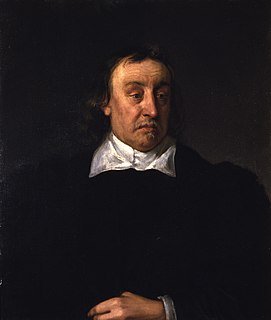Notes
- 1 2 3 4 Lee, Sidney, ed. (1897). . Dictionary of National Biography . 52. London: Smith, Elder & Co.
- ↑ "Sherman, John (SHRN645J)". A Cambridge Alumni Database. University of Cambridge.
- ↑ Alumni Oxonienses 1500-1714, Scadden-Sheyne
- Attribution
![]()
John Sherman (died 1671) was an English churchman and academic, archdeacon of Salisbury in 1670, known as a historian of Jesus College, Cambridge.
Sherman was a native of Dedham, Essex. [1] He studied at Queens' College, Cambridge, which he entered in September 1645. On 25 October 1650, Sherman was elected to a fellowship at Jesus College. [2] He was incorporated at Oxford on 12 July 1653. [3]
In 1661 he was presented to the university living of Wilmesloe in the diocese of Chester. The Act of Indemnity, however, enabled the former incumbent to retain the living, and Sherman was never instituted. In 1662 his college presented him to the rectory of Harlton in Cambridgeshire, and in the same year he was elected president of the College. [1]
In 1663 Sherman appears as one of the syndics for restoring the library at Lambeth Palace, and in the following year as one of the twelve university preachers. In 1665 he was admitted to the degree of D.D. by royal mandate. In 1670 he was appointed archdeacon of Salisbury. He died in London, 27 March 1671, and was buried in Jesus College chapel. [1]
Sherman's Historia Collegii Jesu Cantabrigiæ was edited by James Orchard Halliwell (London, 1840). It gives an account of Jesus College, Cambridge, from its foundation; and also of the earlier nunnery of St. Rhadegund, which stood on the same site. It went up to the mastership of Edmund Boldero (elected 1663), to whom Sherman dedicated the work. [1]
![]()

Gilbert Sheldon was the Archbishop of Canterbury from 1663 until his death.

William Sancroft was the 79th Archbishop of Canterbury, and was one of the Seven Bishops imprisoned in 1688 for seditious libel against King James II, over his opposition to the king's Declaration of Indulgence.
Christopher Hatton, 1st Baron Hatton KB PC FRS was a distant relation of the Elizabethan politician, Sir Christopher Hatton and a prominent Royalist during the reign of King Charles I of England.

St Botolph-without-Bishopsgate is a Church of England church in the City of London, and also, by virtue of lying outside the City's eastern walls, part of London's East End.
Nicholas Sheppard was an English churchman and academic, Master of St John's College, Cambridge and Archdeacon of Northampton.
Joseph Romilly (1791–1864) was an English academic administrator, known as a diarist.
George Heneage was an English churchman who became Dean of Lincoln.
Samuel Cheetham , DD, FSA was an eminent Anglican priest and author in the last quarter of the nineteenth century and the first decade of the twentieth.
George Rust was an English Anglican academic and churchman, who became bishop of Dromore in 1667. He is known as a Cambridge Platonist and associate of Jeremy Taylor.

Sir Francis Prujean M.D. (1593–1666) was an English physician.
William Rutty M.D. (1687–1730) was an English physician.

Edward Lake (1641–1704) was an English churchman, known as a royal tutor, writer and diarist, and archdeacon of Exeter from 1676.
Hugh Owen (1761–1827) was an English churchman and topographer, Archdeacon of Salop from 1821.
James Upton (1670–1749) was an English clergyman, schoolmaster, and literary editor.

Richard Warren (1731–1797) was an English physician, a prominent society doctor in the later 18th century.
William Saywell (1643–1701) was an English churchman and academic, known as a controversialist, archdeacon of Ely, and Master of Jesus College, Cambridge.

Edward Waterhouse (1619–1670) was an English heraldic writer and cleric.

Thomas Wadsworth (1630–1676) was an English presbyterian minister, an ejected nonconformist after 1662.
Thomas Robinson (1790–1873) was an English churchman and academic. He became Archdeacon of Madras in 1826, Lord Almoner's Professor of Arabic at Cambridge in 1837, and Master of the Temple in 1845.
Emmanuel Lobb (1594–1671), pseudonyms Joseph Simons or Simeon, was an English Jesuit and dramatist.